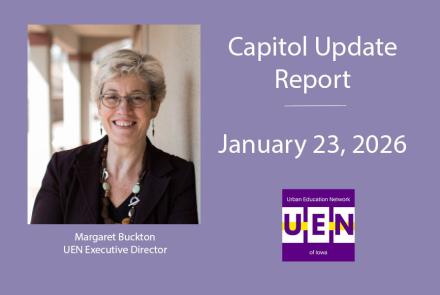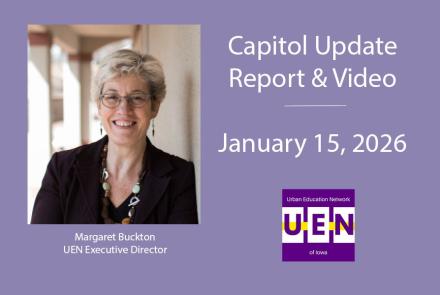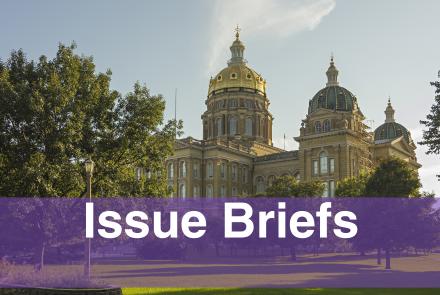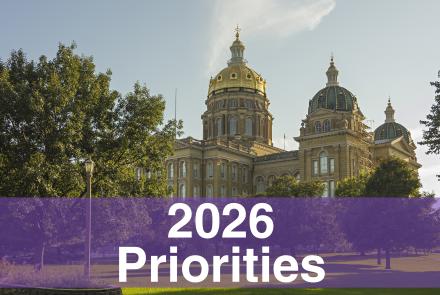Call to Action - Accreditation Overhaul in HF 868
UEN CALL TO ACTION
Accreditation Overhaul in HF 868
May 7, 2021
Download the full Call to Action on Accreditation Overhaul in HF 868
Just before midnight last night, the House adopted an amendment to HF 868 that completely rewrites accreditation law for public and nonpublic schools in Iowa. It is contained as Division III of the bill, beginning on page 28 line 20. Call your Senator and ask for them to remove Division III that deals with accreditation, penalties, fees, public hearings and first amendment training. See talking points and details below.
The amendment by Rep. Brink, Chair of the House Oversight Committee, added 10 pages of policy to the Education Appropriations bill, rewriting the accreditation process, plus other accountability actions. The bill was never vetted with the education community or reviewed in a committee or subcommittee. In short, here are the provisions of Division III:
- Complaint Website: Requires DE to have a place on their website for parents and community members to make complaints (Rep. Brink says that DE has already done this and folks should check it out). Here’s a link to the formal written complaint process on DE’s website FYI https://educateiowa.gov/pk-12/special-education/dispute-resolution/formal-written-complaint-dispute-resolution
- New Accreditation Process: Changes accreditation effective July 1, 2021 (although states that districts and schools that were previously accredited will remain so until the DE and BOEE write rules). Phase I annual accreditation review process includes a desk audit but may include a scaled-back or full site visit. Phase II happens when:
1) either the annual monitoring or the biennial on-site visit of phase I indicates that an accredited school or school district is deficient and fails to be in compliance with accreditation standards.
2) In response to a petition filed with the Director requesting such an accreditation committee visitation that is signed by eligible electors residing in the school district equal in number to at least 20% of the registered voters of the school district.
3) In response to a petition filed with the Director requesting such an accreditation committee visitation that is signed by 20% or more of the parents or guardians who have children enrolled in the school or school district.
4) At the direction of the state board or SBRC requests it.
- Enforcement: Includes a range of enforcement mechanisms. First, if, after having an opportunity to correct, if permitted, a school district is found to be in noncompliance with federal education laws including but not limited to ESEA, the IDEA, federal Civil Rights Act of 1964, chapter 216, section 279.73 if enacted by House File 744 (First Amendment Protections), or section 279.74 if enacted by House File 802 (Diversity Training), the Director shall recommend that the state board shall do one of the following within thirty days of the finding of noncompliance:
- Impose conditions on funding provided to a school district, including directing the use of school district funds and designating the school district a high-risk grantee under federal law.
- Withhold payment of state or federal funds to a school district, in whole or in part, until noncompliance is corrected. Initial withholding of state funds is at the discretion of the Director for a period of 60 calendar days, after which it is subject to approval of the state board every 60 calendar days. Withholding of federal funds is subject to the governing federal statute or regulation.
- Here is the list of mechanisms which the DE Director may use with discretion to ensure that penalties are proportionate to the noncompliance:
- Advise the school on the availability of technical assistance.
- Require a completely corrective action plan with a reasonable deadline.
- Recommend a phase II visit
- Refer conduct of the staff or school board members or authorities to the AG’s office for investigation
- Refer financial concerns to the state auditor
- Recommend removal of accreditation
- Taken any other enforcement mechanism available to the Director
- Fees for Ethics Violation: Requires an administrator to refund fees for administrative costs of processing complaints and conducting hearings if the administrator is the respondent in a complaint for violation of the code of professional conduct and ethics, developed pursuant to subsection 1, for which final board action results in a sanction against the administrator.
- Public Hearing: Upon petition signed by eligible electors of a school district equal in number to at least 5% of the persons who voted in the last preceding election of school officials under section 277.1, the board of directors of the school district shall hold a public hearing on the proposal specified in the petition. If the proposal relates to curriculum, the school district may halt the use of the subject instructional materials until the school board holds the public hearing and makes a decision regarding the proposal. Specifies the timelines for the public hearing.
- First Amendment Training: Requires school districts to provide training on free speech under the first amendment to the Constitution of the United States to any equity coordinator employed by the school district.
The amendment and the bill were approved on party lines, sending the bill to the Senate.
Advocacy Actions:
Call your Senator. Ask for them to remove Division III that deals with accreditation, penalties, fees, public hearings and first amendment training. Talking points:
- Such policies which are unfunded mandates on the state and public and nonpublic schools should have a thorough discussion in the Legislature before being enacted. A 10-page overhaul of the accreditation process shouldn’t be done in secret, without the input of education stakeholders, parents and the public. The irony of this amendment passing this way with no public notice or discussion is awe-inspiring, given its stated intent to provide school board transparency.
- The penalty requirements leave little discretion to the DE director for a school’s missed deadline. Delays could happen due to a Derecho or Pandemic or significant leadership staff turnover. The Director is mandated to withhold funding for two months. Failure to make payroll would be disruptive to the staff’s ability to meet the needs of students and potentially destroy the very culture and climate the DE is promoting to improve social-emotional learning.
- Schools have a transparent process for including the public in curriculum adoption.
- The ability of a small group to subvert the will of the majority is not how our democracy works. There is no minimum petition number to force a public hearing. In some smaller districts, 5% of those voting in the last school board election could be 10 or fewer people.
- Once a public hearing is held, there is no provision in the bill to prohibit forcing another one on the same topic.
- Certain content areas are mandated by the state to be taught. This policy puts the school board in the position of following the law or responding to petitioners, which is an unfair position for locally elected, volunteer school board members who are working on behalf of students in their communities.
- Also, just FYI, Oversight Committee legislation has no funnel deadlines. Rep. Brink could have introduced a bill, held a subcommittee and committee to gather input, and moved it forward without forcing the House to suspend their own rules to consider an amendment that is not germane to the bill at hand.
UEN is now registered as opposed to Division III in HF 868 (although there are other provisions we normally support such as funding for mental health, therapeutic classrooms, the Iowa Reading Research Center and others).
Contact Information for Senators:
The following links will help you find contact information such as email address and often home or cell phone numbers, so you can easily connect with your legislators.
Find your Senator’s contact information here: https://www.legis.iowa.gov/legislators/senate
If you don’t know who your Senators are, find out by selecting your school district, through the interactive map, or by entering an address here: https://www.legis.iowa.gov/legislators/find
To call and leave a message at the Statehouse, the Senate switchboard operator number is 515.281.3371. You can ask if they are available, leave a message for them to call you back, or just leave a short message such as “remove Division III from HF 868 Education Appropriations dealing with accreditation, penalties, fees, public hearings and first amendment training.” (Legislators are typically back home over the weekend).







